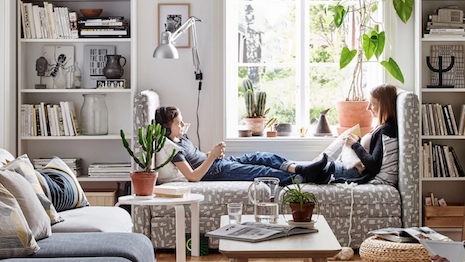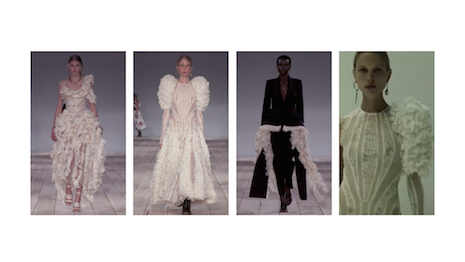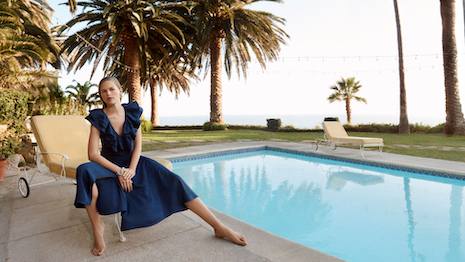Sustainability is primed to play a key role in retail’s COVID-19 recovery efforts, and mass-market brands can offer lessons for luxury labels going in a greener direction.
Speaking at the National Retail Federation’s Big Show on Jan. 19, sustainability experts from Swedish brands H&M and IKEA detailed their experiences in navigating through the pandemic. Rather than slow down sustainability efforts, the ongoing crisis has encouraged retailers to develop smarter and better environmental strategies.
“We really believe that sustainability is a key to recovering from COVID-19 and the pandemic,” said Abigail Kammerzell, U.S. sustainability manager for H&M, New York. “Both H&M and IKEA really believe in the green recovery.”
Sustainability of mass retailers offers lessons
It has not been business as usual for the last nine months at either IKEA or H&M, as both have adapted to the new needs of their customers and communities. However, the drive to achieve sustainability ambitions and goals has not crawled to a halt.
“We’re working just as hard as we always have been to achieve our ambitions and goals,” said Jennifer Keesson, U.S. sustainability manager at IKEA, Philadelphia.
As retailers of all stripes have discovered, more consumers want to know that businesses are concerned with planet protection and the wider social good.
 The home furnishings sector is growing, but IKEA continues to prioritize sustainability. Image credit: IKEA
The home furnishings sector is growing, but IKEA continues to prioritize sustainability. Image credit: IKEA
H&M’s motto is that it wants to be “truly sustainable, genuinely inclusive and entirely fair" and so, amid the pandemic, more attention is being paid to the ethics of its supply chain.
Transparency is also becoming critical for the clothing retailer as younger Gen Z consumers are really demanding and want to know where and how clothes are made.
"They really want to see everything that’s happening down to the factory layer of the operation,” Ms. Kammerzell said. “What’s the implication on the society that made the clothes … and what’s the responsibility of the producer.”
The consensus among younger consumers is that a business exists to improve the society and community in which it operates.
The conversation about consumption patterns in Western countries has also grown louder as the COVID-19 crisis rages and consumers become more aware of social causes around them.
Executives at IKEA, influenced by the socially-minded Swedish mindset, have been grappling with how to address overconsumption as home furnishing sales grow.
“We’re actively trying to find solutions and services where we can enable our customers to be more sustainable at home," Ms. Keesson said.
Sustainability efforts at both H&M and IKEA involve discussions on the circular economy and upcycling.
 Upcycling is core to both H&M and Alexander McQueen's operating philosophy. Image courtesy of Alexander McQueen
Upcycling is core to both H&M and Alexander McQueen's operating philosophy. Image courtesy of Alexander McQueen
IKEA chose not to promote Black Friday over last year’s Thanksgiving break, turning it green instead by promoting sustainable actions that can be done at home.
H&M, meanwhile, introduced garment recycling in 2013, allowing in-store shoppers to drop off textiles in from any brand in any condition to be recycled. After being paused due to COVID-19, the program is set to resume this year.
The clothing retailer also recently launched a circular build strategy, so all of future stores will be built according to circular guidelines, with fixtures made from recycled materials and other green improvements. The brand has more than 500 stores in the U.S. alone.
In another commitment to corporate social responsibility, H&M also has philanthropic partnerships with the ACLU and the Trevor Project.
“The strength of the communities we’re in allows our business to be strong,” Ms. Kammerzell said.
As large retailers with superior brand awareness, H&M and IKEA have more money for sustainable investments and hold more control over supply chains.
According to Ms. Kammerzell, H&M is making significant headway in empowering its contracted garment workers, who are primarily women, with valuable skill sets and safer working conditions.
The brand now aims to democratize sustainable fashion so everyone can dress in an ethical manner, no matter the size of their wallet, per Ms. Kammerzell.
Similarly, IKEA is also looking to impose its high standards for sustainability on its entire value chain as well as its suppliers.
“We believe that being a good business is good business,” Ms. Keesson said.
Luxury and sustainability
While retailers and brands such as IKEA and H&M are not direct competition for luxury brands, their strategies can help set the standards for the shopping experience (see story).
When it comes to green efforts, the tactics of mid-market retailers are widely shared by upscale fashion labels like Stella McCartney and Gabriela Hearst which have made sustainability a core tenant.
Gucci, for instance, is setting itself apart from the biggest luxury brands by consistently placing sustainability at the forefront of its marketing efforts (see story).
According to a recent report from Deloitte, millennials and Generation Z, who are expected to account for approximately half of all global personal luxury goods sales by 2025, have already adopted social and environmental issues as fundamental and essential principles in their purchasing behavior. They are outlining new rules of the luxury market and brands are recognizing that sustainability is the ultimate goal (see story).
In most cases, sustainability remains a path brands and retailers of all kinds have embarked on and will continue to pursue with enthusiasm.
“It’s still definitely a journey that we’re on to make sure that inclusion is part of every aspect of our business,” Ms. Kammerzell said. “You have to enable the trust with customers and that means really showing the progress that you’re making."
{"ct":"2A2kOoNmGEvifbsEIkRiXmRSVvIjBVlTC9fO8QJD1DnDmop7tc9kkjGmcme\/St9KojDRtY25of68z\/qA\/gGutxURlFV8FfPX7oZfKkX+oTc8bZKKGXLNwr\/MjS81oJReKm2xDCt6kpHtaP7jTG1yeCz2FwOn22okdlCTqruneQnaLa5Etw\/DfegB2YEwajxMO9ldM7r48aUryfH6SOdDYk6MhsASaWzwK0rLCLoVpT6fppKaPZ6KzlxwUErFAJJhg+6o6AoLVm7td+GxtjED4TR5MTDJrJK0VQOV7Fqk6YJ386A1FoRUn234n9Zq0mtJi\/PcC0FbtMJnqr7KgQe5FBmXHRZqHH0tTBIjSS3+ZB3w9HFSe\/Px0M7FTwtf2pp49pnNK5DuriDaVRQxZpTlpEFKWAST\/GrWIJ5D1AQkh2vWHK5txqttUmJVIUVe5rzwWiS+vJO1VRwlD7V14DXLw2gEg6t0ZPdapT\/d7OUnenYe8kggRI4wq9VAutBkYA8EU0x\/u5X9KRJNJbcJi94NimDSguRCDE1nfdozyQ49rW79dVJVKopJtPDmxRnPLIyr1jjVVHZ8KU+pguTPntHimGswNFb0lnTHc4vovY2iZ2g7AMQhfJ+E14P097KOd\/XLxatYiFoM+2qzd0CKvml3z5+BQKjkrEHV94TZx+ah2W6dHUV2q6sZ3W1had2Lnj0R2Ne2PljLn+a8hQ+h+vrxncAV3fd1Dj7LWekIPIBXTWbfSZoMQuOzeYsaDpYgZoCzrsLbwLyJkds9Ye4DkSa2AmnvtKPdWtS5iuR4JFJh5BCZBDKAtI7YWoIJWUzYy4ZMRFn\/kxs5gOFCkKMRkDPWqBMogD2r72T\/JH9U0sp0hRRDJBEBkFilnNFFFnk2hnEqzU9GvjZ3Iw4rAOnIbyADMwIplvrBOZrQBAxNgsKZPDDaqt1LSkHxJRHSZPrdBvmxdYPplnOtiUPoL+VkDIlyWeDdzmqWL525HEhMaEDxIDwub39zblgGBdLiDEF5StiJsTT5pchwwXbI9vwxup5958QuIBfWbe1f3dWUVIgBwhElBAOtZBEL9Hj62goPNH\/6EdA3i9vHus2aHXjs0e+sKemnbinpnrIaykYMV+ARrHEZJ1NNTCvYsgQltsecXTk72xJdvDofYjK65cBJbye0lyW1+UYS82cgmTYEpnhyW+NPcqUjs0NF45x7+\/7\/0TArn++jUuAijYci4Axll98zVyFWS5mttGSmn1wpbbIngV60GvPlc7hB6Qrpn4EKSxHjGyzLxlVPIGOJsw\/gt8o8w7smSeHzK\/nXtDg\/EgpAxX4oMf0f9JOA6iORYuxvwjkiYfpDIFpgAGr1NMaPuwuQjUU4\/CDgra6C8vFLca+XJ+pEV61ILOTDKqSdffXAPelVXT2U3Ps6W+MPL+duZi2xZOAUqGKgOnc9b9FCU6YAMDJ10Vk8vt3mHH2PTCkP93EEbgs\/rCVj\/AL583CcheRlLFSv7vt6nMmJIMVOmamIbVXg3fQnj3tODLzZP5jRrl5aGChkkeDxy2uF4Ocr7IlQIwb3C93pUXMsQk\/+Z6ELZKHYf\/1FOqoF4bpy7vMlWt89dFJwKKc+GLhvYDH\/zBrjlwdy3xnSNFVhAo0fx5P3yuKB8YYsgDZKApBww\/QVZfhg6vj81zaHKzcyK+dQxcBthGYJXgtwFwrzz+JcLyED8nAXlRk\/4BLz3ZeJm5h+QepPu4kpxpvDiWCV2lhrlm4MgWu0BOx1wpa8HJkzwGmV7OrrgSiJqeWEXNC3QL7GuAfYzUDdeaiSzyHUt2jEyy1JcyxaHDjpizXzqnoElwiHsUiUWW3HBCobcPEl7onut2ZcU4AnxmnOQ2M9WKXjNRBA9Z\/s9wyiswV0msSNf9CbKtiYCDhjI7PxN9T6uv7wXuFWZNJb3aA6iNOaNKO5B+6TPkbWLj3V0Pv0euuY9zhvtEVcWJNJbOYWDOrR+hEjlcxwnMVotWZYhXhv7SijUoktOsMhRHtpXaN+3P8LjTMTzPuE7SlRtpHSilTMwiym0GEmlR2MA\/4khK3bl4MMFGcoZtubtuUY8qwx8uLNYOwh8gaDI7nKR4qln7\/leSo8k\/X\/InAwCcJtHtzIK2IeGTsyZUaCfN\/vZtyZ5YrWsk6b\/KuWUlnTdwYeaP0RoUwj8DhKKe\/eUXTC1Hc3KJYHHDv2GYd6hhv8L9iJu5ucrlhgehNtDRtcmNvS74pWtR03xDvm\/\/hdsMUIkuESdlHaAN4NvPqXPz9Rkfm3uoX7biRy5\/cmRewq1Y0RGzNyFg1FtfMIaz\/K3ne2AAnX4T37WpKx23sC8WEWmvAtr7qje5usSUCFW1v+AFLHlm+\/Bar4VkjsQPjHPCvxZFC9N2uRrxwiZhUhSrTcbQx21BjzAibUCZvjA5akIVn8tb\/KgwsYYBKw\/fdSwIxXI+1haqNsUE+n74a9LFp3lxmqDla9mspPDkWgAMmIvqATxCSoj7HsG9TGfOj+yuBFu+18+gzEcuUD5qDLI8NL+WIGbwBtHq69AE9vZ7rlze15AalGf41gp\/EQn0QPzq5rnuAnrUz770HgZviyNqx9UaHInUT7YnViMopP+KeT7qymtag3uNyyQudYJMglww4AObBGlCyvG\/LpCHPAzjSuWLSWIBWc1RQBMzg5RN6VV6Re9FSZFsOZgkgEOs+0k0\/evouNmYj4jCQPqdAGKEa2HBBK+5mlFQVEfACWAPGtuxmsQ+Pdt4qtZYJJOF+TwjkrsjPQSjaeyfCgLq+XTnvXT9SLRn\/dMHQsQ2JIj5qQanhMWtEOmqPvNG2x4Kgy8L3ce2\/PvNkDq4TvqGx6euGSRI8WiG7zrR3vLM5tKvfDrK18p9qk9siaaxtVykybk7GZBJc61a7UBanfvEi8hDWCAUWCVR\/klhlrk+ULDZwmi5cVacXr8RRZIB\/y6lLQsfhqpUXZS3iHG\/fv5mK81JsBlVSwXmdqveSUnKS\/8MksAsImh1nVuit53ywjDbn8yQ6FVMyFF5fv76rKx0I\/XRDZQ6s0NKKbCRtrRHVr0Uy70O1ZITrI4bPJqD1osUkpJWG23iUdYPh8pP+3R1\/6m\/GsFIGBC1XzWymx0SpO8UuyRC7sml3YiY1zV4uqKMUJYq\/rXGs0GIoSoNjOvkwpajlME\/tr01QFr0QEGbi5lPyBIM0yGfxhSk9i0VBg6GHHmGnWPBFmgfvSF4epcd6SATu9LRiv52lZ2zekoXDAhYmZ+cvYPpr3AXRhkns5W872vIUdKvPZn6zt+SXdwBo0VTZbYhx+st4Qv0iR0+VR7cxaiNZLJzqOq8MNnlhmku0mVhpdIvDlW6yc9GaiLuejjzPDMJ9Md1p2aM\/tA0IKyqatsT2nO4vLTMSiqjdCh\/PoxsP2ngTfj1Ccj\/24EzhidiHnbnZsg4mlTKqwKLx+\/DeSKduG192FM0pfj\/+n7SKgvjPyC9ANcseOgUHTORP8\/WQmThXRqOfFfpmLp0N41FD3wYJw+XsHfoICR0Pd\/RMwEHL+hRLzXwkoDd+36lH6hSYEc0ImKtMF\/ER8e4AO5ViDd0fwNVFw+x7zGEDC7wDqCrU6gTU+Mbc5p7EAYGTjMUBhubqzL1EHUWMnv3ZjILWvpnwODv\/kNNqp280qbeZLStI07GGONLVMYha61LlHOLGw8eEtyNRGtao7ehjl2BWpNo2k5HGX0chaecN1TC9DR+6zau4MIJkSwRrn8+yxf66liGymgWhK59XfvAQ1Ib8\/8di2c14zP4NiOnjGICqLsK1Y2Ehc5UWh3OFOniUgmmj48W\/m3JQ746JQ6IFlfny25w1\/EhIUpa9OB52v7lJYftYzR2Ig+GZd5Bi\/COBsVgZ\/48EazF6XftSagUsJ58GebNL5WHhHtxaNEAHKllDbE\/oD1L2v+rrtAM7WeOlb+vjD\/YOo2UsZgbKKcFho3jrPcHlxa\/\/ur\/DwXajsADS0RXrKEX6Nn66bumaeN69YHkvWyAOG9LqD4iJijntVd83VldIEsH3QcIpQT7+h7rMaXreS2u9RVQWqPZxAAe4aVfiEbNnFxzvMBaoY8Rn3vt7GI3k1xQiMprbjKUagVD9ji+8P7SgKhcWEoTwuHzZPZk6gg+PlvsYrUHwjQxBbuHaH0AUCUaFwv+C\/ZUFWNH8T1HiS9mQleZ671dSL+DvZxVy4ASCL7BxnXzfJjo1qwFf4+EbOmyR72PMmxSnzHJdeObHC9wQLo1jtGKl8lta4ioftPJ7Q9Kb2bpN888UqczIl6XalEc1ZMMscilylMtNJwdlqMG\/FDGFOQKVMK9j0lxGPZmg8MQqfgEiySR69k05l9vmEl2Hg+F\/bZlsgAiMyV333c1VLh\/Gnu2ICS2HVRvykNuFOGgPQkHUGsMUl6JnnYjCpKPeWWp6tZvKx5AmH85g+X76vtLzzzyRvKa\/zOPpNBmMwh2XKD6eY3eQeFkOWsdWqMZw1geSpCVfBFaLxBu+dS2sV0Ea3C6xRY8GP+ifk0CxfXBwZdlGI\/5y6qRkLt\/KYqyBWMYd\/pEySBqa8a+3drPUtC5NbbBXZeeL4xhIDTucs95frVo4ZBLURmZ8Rn6Q4DVSBLAE893N6TcX02DxsKVDbtnae7ebvmZl1TimGDzocEqM4s5XRD5ycBSJqebrqgmHVCxEhB+bVgLvYRpnGxCSWWSPB79Yps7XTzEa8JOJaTlefoE8sbFC8RpDGvlzK6LOoch2LtP8O4Pn5Sq6NHngdvXywH31ihG7Flqs2ihUiCG9uZeL+cOOiSnzrQe6d1y+JX7eIsZ4H3qpjKe0NXPB5ch3LiEDVjx+JLiuyT91H+N+jfttHDSmvixthun2kpTjWCW2yEKLZEMoHOf3+DM\/yxONfxbxrllk\/kg2sHeCAAQsyO5soz8SVcjq8NpgZffXznRrnEtlJFz9xSCvNDHF1PXYpD3P6lNYUgh+g37WuGFzGI7pvT0BWpFO86VRJu1A6FJosCS+EUbPJXVpr9Gu9DOlbyc6RaYhfVm7cjV9AZBsVLdbs\/YtBNtE+vIKr0WL9anHm8mJwIV25dDz\/oI54scSibFo8Ij7yWXNMS6wsu3wcmc0zqr1qUPi1SrpQ44aVAyM\/m20ljr0gIaVKUU8A6T0YXO1RRsvI9rcTdVh64XOU247Z38VbalZE6IAf\/9QQcIodEmG73zklFPRY7s75bonGOXUZvMJVePiC52WsoespDsEx9sh5yIsbS2PQkOaLBSj5gJcUUrxDcYNJ7tdFGHV8amYxRMLbcslI1gcTNREF10ub+YBuQj7AdAY2CoGmfK0DklEM1ae702ShzwpYnc1JKVnltH47MNp1i4JHtX0eTWVYHv\/uYfmasRmYamhORUREq8xbuLVpMH3vo7\/6jhaviB\/EcQzaPiz8r5G6UZs22SywRrZhU8RtoXqOD+n1xO2\/aIUG5S6+bBZ9hinU62awKNPC3jImSA7N7BqyZ+B+peAMm+yLhcAQ77e\/IlcOSQLiLY0ZjI9VIzAkIfe69OZukN4o3\/ydA2vXmMpIqnIDqIGdL7av8ch1knFbA2i1xwBK3FG4Odnm12s\/aszTuPFCfokNLn2NFSMAg3HBkB\/CHTaDRWZyN+HOFJj+Cm\/\/MXOGYrC0uf2PO8+0OftHMHIw9k\/3IHC0A6u7Rfk9gKSwkdJoZMyQCjpV1y34gS+xzZ6vBMO8DkebR250XLNNYi5tdAf\/mjXwkqD9tmd64YkVxij4nC3Jutzoo4rE19xVTLmqjxKOgK9N6O0IBOoUNy2BCi9ObKtCJyTG4ysUnxH06jDo7\/qaZjtKGgmqx2paeg3Uy34wnBrl2w1zOHckeHJ5wIMdKKUVzbjZUSOrCD54urcF+fvf2+A134j1uhXZy2XXXhQ+DF6MrFqwWiIbDVIJxo\/7TCd5EnbsGQtKQTO+jKH7aI30BkwRjiHLQ0oRSCX2YqLmGRUXCL0jjgWg3V2fem6mP0v8zRU3QwzvhfbAgLZfV3p\/s6PxlLUH6ZW9b6VjuPwb7RXtaFvVe2WLU3Ci\/Y29U7cD\/CNl9I1EYEMriBTsQ+xgHjfaPSYEaqejPGAtZ+UDCWn4TWpaFh0WUcGHgQPj2Ct+uPM6RPspVR4Bj0qycVhbd9fVELzibFiWdtDhAy0JkU3LrdV1Dp3hLXKZsljLk4KpFJXs4FZjL12ZUIYGeoFx0XRc7J+qHJYkq+mrC9N8Ppf8cH4RIhaONa7o7R6W\/3BRJIJ+8FVTKn8tF5ub3xTdnv\/9kGxzara0z7\/oNF1YpByfNndIRCaYXASH0vxdquM\/tQeHj3C1Qs7Owa65DlGY\/uNAEOSF+OnMckztBPdKCirRsiYUa4Nme64jjC2pl2sHf+r\/Y0Y3eoHhEZRQc+\/exvbXFyr0aoVHVuOxBHUsfmXLsB20tkcKUU2P31X6b3RFRG34gf\/xv+amOC3GJrxfCcutidOK7d8mumjcYDD7apfD3HMVCz7GuKwGv+W06OTUBo\/1PgmC1i3Joaf5tjVql5GkFPGxxuW18GWGABhKKJeX93BtoK1emnPwVLabK+k2A6DoF92Ujzhv43KNSRo+Os\/ixEXcXIeUDfTVwREc0ZgApCdCw5kqAT7BXSN3MrOVTkP9PN7iN49U5dkz7cmMBJvEBjLb4GhUhv3S+2T9JnzuLA217q+OzRbZKEkSNf\/GUTEy13y15KJCc+hXr7Baz2FOq1JEdXcVzv1U8\/QtYBGbsngDp0XLoCHE5UNgBU1aku+djrrygiJyppBikpT9akspSk7BktT9JwYcNL8gptDjWd9TYLvy\/ckz+7g20p5B5F5FJtwz6sd8N6QVNaQdg585IZ\/SaUreVC9O6HwWCNtpdp12qBOBtlmFzLBvngV3N8YtsIPelKV+TuwfOnt\/JgpxxjAr7cvCPqZ2CVPxyedFGBcbfS9hPKxgcYbUkLbjaenZzKO8ZJzSoSMvb9xdrPdMjLdFlKM0YrazpfT93GoToFFoF7dROCnSTIK7jq9nLYQPI451RHjzK+lkmXDqChvUnqHfku70QUi28lVoSgJ6A1YcmZw7qaYulz3di6xKSTo+oS2Zclgf+wCtVwXsTrvvAdLET9jUwVbGcDb9sfG5QuADXaqWteD6VC4XXXQPPndTloSF6vvuaIOejNRZfEYyjcJ\/Um1p5a8zQmLKl\/XiYpQxa\/utzTtOdOU2MlX2XyirdvprPAHa+8V4o8CUjjSOwZPyBjVfOe2VhRZaNioyj6DFqkLqL3O2NsO5jyzUi2vFW5edYHTL7bxc5jaCRl6frd\/1SsM5Z95NzCuRYGSIUmZBGuu4EK5r5o2q4XEap9hJ9lwMVYW\/IppGBTubpmfMNyLU74FNgqGJ5Sq+dtnqqPkc+Py6FiCYTdDXjwolXwgqThbU4yvvfnPbHVT5sdcosyb7ZiiLv+feTkK0OZgBzJgfDUiq8jDvZwHVdPPf\/3h2DFzrEYTCOA885pUpa++aHJiSbQsFq7kSPCHsXSnYdNeU9I6q1\/Ojlaiyyi0fNSW8ckGE4ROQdFRa4lMU7CnNaD9D0e1pAytHiJozG1RYcW\/m8shgZwO2rPEXrjuBgB0y7O0W7JxBWaQk2zj3bJapCcHI3UM9F9T0WFD2NTCQ10lOL7hXIyly5xIEyeg206D\/84oHoJDcT0fbQCMCR0n\/9\/BkwyXZS4C\/GBJ+weYxD+PKEbJCKfW0w2N+OrZucyp9yTKtjzr+7DrkLScJBdlh8hv4VszuPVKFNHyitT0M+Jv4pTMxehvujItlEysEnHfQs0vwEzLCPJEuitn0L\/Bbl\/9cNLN3maAs9wuf585YKJB7IVRsiHuBo1kj+0QsNATXqns\/lhuoBud0FNNMbbflULeFNi2hi9Al8GqavTYkFOHLRWg7\/LlUnPLEAbmAYiBE7c4gTib2Lx54wQApwNxqoHpvLrbwRVJhuDHz5n8QE0mm46CkKk8RM2Bx6b3T8ORGJH9WgeI+BRQ7sr90uAfiIJ81OT1aRiB0kcKIbD8a6D0CLae97u16CwfH1sWZHu9FFrIqWmOSrcpzM5ophUx28rV\/XhXNTm1pvPKzLqs\/OB0avFQl1dRRP3glE48boQhT9u7WvpS7GsfsQ7lGORDy9ojNfNxd\/1m6vacOg1W39UG5H5jM4Bxpak0kPT+CCKmP803K5jY11zTrDQI2x5zuKDbZ6jNrtk0oqs4YyUpeL6\/udZNRRFbqPk18rUaYU8pN1oPtG6Ki6\/suw6fcZSt1FG+I\/olLQcpZQ9h1LP85oP772lkDOfpbhEgk0bTEqc0tSF8xjdz+DWo1\/RsN4ifhrNfsbc+n8Dya7VFLs+DBNFqyHfhst+GgClftEE\/qZf56ZjUw8teYVSqJvyKoYNE0\/d9L2lSZjCFViHO5qV3HXmE4JAwTjt+0igRyCyf1yQXCKBhPIZ8FexEH8TH7hfNQR5Xtdf+ImJLnld1L9k+wx1awxzvdGXY0POpPoUU5Hoze16qACzbv3TLPyMiF3NcBtlR7HBGV3g5w5aGQOAY8PLZ7hAjEGBkYm0O55BTA141sHr4Yj4eXDPTNBfLnv8fl1Bric9oNA4+60GxQhZ1Qd9L9O35g1HCrG4mU3hlL3i8msg0FYzIpT3HSAZLQ8HdZIgYzxSuXzg0qcIgwvIfURVOlhPjrgS1mGjbjosOfKFGFzQoaodGJdLPUGLor6msz4NND11yTHjKaRtUmoc+Fo6oXFfRN0G7\/np3NbdPSdKvrMVpuNMMzpydda1c9o8la12Akzm7zINVr2ybfm4YdLFPrLB0qU5q6GytvCjO6n40A6UTJXaEnMoYJ8Gviy5HbrGIHZjvdbroId5c\/qTXYcCtI68J2Vkgx\/A1+1axXnJrZi3GlH1k\/SuWdyhnJNSQDgdd7gjseazjNqRPbaoDm67roNArz4mwHwpYHpebn8XXPj8NWu\/0az5fu3Np8PVmYBZERcbU8Wr9M0PosW\/\/9Ez1nHCSB4EaJXYPv\/s4mmgiaKM75DpBG\/pF2zzmYCpO+QY0V2svcg\/pblhsyqhlA5+S9cixBIbR53jVY7WMw8ricCy+6eoPxiUD1KX\/cbtxTlPd+sLcrqbKWK9bQbGD\/o6r+AqFECJ+LDIKsbiBa5B11VBKfcg7QQpfru7Fh4i8A2lNrsGXaSSbWGOFQgCw8oK0K6Cn9mc\/fTdagTkEw7Qv37Kt8oLzg9B0e352FOliGoDMcXRf0aU8jY9SnThs4AJQJBZNgIKpg8+TkDvgawn9Bph57YgMZD7KQ+cvhBtcYKXAFHGrdZTg\/Hw+QqWaPWsZ7t5ddwGvmmwTdCCOfTErxtuiYZARfsXdFKPk2otsdZACj481NRjktVrv6SOSSgy8rt7e+PHDZ9uxu48QWE8WA7fL2WoU5\/A4\/r0gmJDf\/F3h0tukucoAMHHPjixNLL2+HJXLR2JLJQm\/qP\/Mf9pBvBX6QdMMVDM9zkHGQLxldkiUnzppVPuBGpHsQhgX3UglUbn2zJTjpT1uzsUlDpmgInWwhCk+102oxtUHs4fSB0eAfdceKgCiGs6P4cG+AjCfTWbyrk79n+Ls1fQo996GwIpnfm7DCcpgjTWd9n4LK5gWQG8u4XQa7QcPW22G7xcR9F2W3P649rYV4gGCmudn9TymDEDx+nn3hm12CA19TxMI2UIgxSHIWunsi7307mtuI\/LIcmCjVm8so5OOhlc\/EKtOf\/NoL7f+wNeFm+sxhwm2cxcZDNpKeRwsEwaQQbcCWncLv40oVTre26uSkENAnohjERO2U2MgUstzyVfHyBYVJF3RjQVj\/TK4+iap5MEqNLznveguFZiqXormpSnWYrvRJCho\/OJZ9uQy7Rh\/ufAdq7eHdR8s3p+lU2brxBioG6brjmjHrYTuqD8sVWDJW9F\/dv5ZEg4U3k1J+mmwc8pp5ZJk66qnJ+CrLnqO8PTQFKparTCh+HhSXuARoNwbNKO6OVB8ZH\/cti2yD9U+5CfzBymqYvt9oKCypQzpQXBnSNnVvFutAFdf0Ew5046+T49iCin1+D7vrGS4uA6GhwAs\/HIIcO9jSlpcdV7m8fW\/MoJh7UobrFYy8CNmXyzgrt4sinMbjWCMOjlw2R0oWPdpwragBKBVVCe2AYQiTBpyZpsyw3LZxqzkRxnMWSf\/SXOmF+D1WBE0phcdvMmMxOQ8WD3HVySNTOpf5jhZj8HGaP1aY3HUcpk8So9RO8ZNpgr3PVhg0OckKUsWsfFlsgFdLxA9W\/ccdADYKzJVUOwPEy70\/AOzaeblFXWqOTebLMMs\/SfXbz93sh2SKQuk4WXYlf4UKIdaS8vtl77xCAD1B1C4y9SwKUES2x1cjJibn18LNyaZZuuDhtnd9vzS7VZ02LnZpwhIlraa6rggNFi94Zif\/y9IbgP1fmQ2rC20SlzUyEOlftxDwg4Qi09BCs7nsnFIBcw6awpSNek7oVRyUBTHOwObIal0uaFTGhXMqyb4m9EieQUN1QSj6rQKJS9A3zXk5PoysqGrGk\/Vdta\/mgRHx3fVJxsjP1Q==","iv":"9078b9fd8175f119daab1422803c090c","s":"fa46c4e3c618f549"}

 H&M encourages shoppers to recycle apparel past its useful lifecycle. Image credit: H&M
H&M encourages shoppers to recycle apparel past its useful lifecycle. Image credit: H&M  The home furnishings sector is growing, but IKEA continues to prioritize sustainability. Image credit: IKEA
The home furnishings sector is growing, but IKEA continues to prioritize sustainability. Image credit: IKEA Upcycling is core to both H&M and Alexander McQueen's operating philosophy. Image courtesy of Alexander McQueen
Upcycling is core to both H&M and Alexander McQueen's operating philosophy. Image courtesy of Alexander McQueen